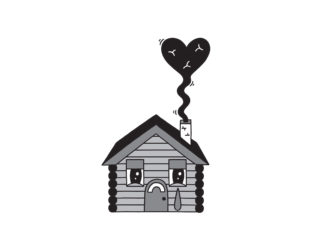Death is real but so is the comfort found in Mount Eerie’s overwhelming grief
The comfort, reassurance, and clarity provided by Phil Elverum's willingness to share

The comfort, reassurance, and clarity provided by Phil Elverum's willingness to share
I think about my dad’s death all the time, but I haven’t cried about it in years, so long that I can’t name when or where. At three in the morning, I’m sobbing while ‘Crow, Pt. 2’ plays out of my headphones. Slouched up, hair matted, sinking into a hoody beneath my duvet. The final elegy from ‘Now Only’, Phil Elverum’s latest album as Mount Eerie, is in its opening guitar notes. Enveloping, sour, intimate and finger-picked, like much of the album.
I’ve been a mess for the past half an hour. My laptop keeps reminding me that I’m up soon, but it feels wrong to cut the album short. It feels wrong to be listening at all. I’m reviewing the project for Loud And Quiet and so I had no choice, I tell myself. But the review is already finished and I know how I feel. It’s a masterpiece, my first 10/10, which shouldn’t be a big deal, but vanity and all that.
I couldn’t sleep. Elverum’s voice was ringing in my ears. He rarely raises his voice above a whisper. Still, the rawness of it – in its cracks, its wavering pitch and howling moans – something about it makes you avert your eyes, even when you’re wrapped up in the story. The closeness borders on voyeurism. I press play again, to make sure I have it right.
You can hear the house breathing in ‘A Crow, Pt. 2’’s DIY recording. It’s Phil Elverum’s house. The family home he shared with his wife Geneviève before her passing from pancreatic cancer. It’s the house he continues to share with his young daughter, whose amorphous childhood grief he describes so painfully on this song. I’ve never been to this home, met his wife, or been in Elverum’s position, but I feel like I know it all. It’s an uncomfortable admission.
The entirety of their relationship is mapped out, from the life-affirming beginning, a chance meeting full of hope and possibility on ‘Tintin in Tibet’, to the failure to grasp out to any sense of his wife in the album’s final lines (“With arms reached and run my fingers through the air / Where you breathed, touching your last breath / Reaching through to the world of the gone with my hand empty”). It’s all painted with such specificity of emotion and place, closing in to every detail – like the postcards on a fridge on the album’s cover, or the ritual morning acts of a grieving father, on this final song.
“Death is real,” Elverum said on this album’s older brother record, 2017’s ‘A Crow Looked at Me’, impossible to avoid the reality of it. That first grief-stricken LP dealt with the immediate aftermath of Genevieve’s passing, like the most intimate of wakes. We listened to personal stories of love, misery and memory, sharing in some catharsis at an uncomfortable proximity, but one still manageable, easy to catagorise. A grief record. We’ve all heard them and been affected by them. Nick Cave just released one. Touché Amoré wrote a stunning one. Bowie even wrote his own, the brilliant bastard.
‘Now Only’ is a different beast. It’s after the wake, when the guests have given their condolences and walked out the door. It’s living on after the death of a loved one, dealing with the absurdity of it all quietly, as their memory distorts, flickering through less frequently. For many, the reality of death takes much longer to hit. We live in a surreal existence, waiting for the loved one to walk through the door, seeing them as real in our dreams. When that feeling settles, and we know it’s not the case, death is just absurd.
‘Now Only’ is that experience translated on record. To know Elverum is a real person is crushing. “This is what my life is like now,” he sighs in the album’s bleakest breath. For many, including himself according to a Pitchfork interview, the album barely qualifies as music. The songs are stripped of a protective layer of artifice that can often provide a comforting distance. The usual songwriting formalities are stripped away. Elverum’s unfussy guitar playing colours lyrics with new shades of light, quietly guiding the listener to the places he describes with such vivid detail, into his frame of mind.
Throughout the album, he struggles with the realisation that Geneviève’s true nature is gone, his attempts to recreate her failing because of the distance time has created between them. His memory changes constantly. The album is as much about the purpose of art as anything else.
Rating ‘Now Only’ seems wrong. Even calling it a masterpiece feels like taking an individual’s honest grief and holding it up as a cultural artefact. It’s important to recognise that these songs and these relationships don’t ‘belong’ to us, even if Elverum is boldly sharing them. But Elverum offered his thoughts on this late stage of grief with such clarity. The scariest thing about grief is when it’s gone, and you’re left alone. Even though these situations are so outside of my own, hearing someone else capture that ludicrous hollowing of grief brought me comfort, reassurance, and clarity. I’m crying about my dad’s death at three in the morning, lighter than I was before.